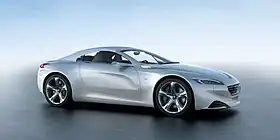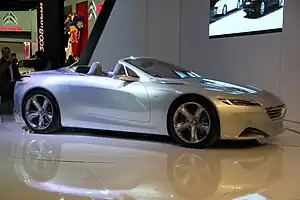| Peugeot SR1 | |
|---|---|
 | |
| Overview | |
| Manufacturer | Peugeot |
| Production | 2010 |
| Designer | Gilles Vidal |
| Body and chassis | |
| Class | Concept car |
| Body style | 2-door sports car |
| Powertrain | |
| Engine | 1.6 L THP hybrid[1][2] |
| Dimensions | |
| Wheelbase | 2,595 mm (102.2 in) |
| Length | 4,823 mm (189.9 in) |
| Width | 1,917 mm (75.5 in) |
| Height | 1,246 mm (49.1 in) |
| Curb weight | 1,525 kg (3,362 lb) |
The Peugeot SR1 is a convertible, hybrid concept car by Peugeot. It was unveiled to the general public at the Geneva Motor Show, in March 2010.[3]
Overview
The SR1 concept incorporates HYbrid4 technology, which was launched in the Peugeot 3008 in 2011.[4] In the SR1, at the front, a 1.6-litre THP petrol engine with a power of 160 kW (218 PS; 215 hp), is combined with a rear electric motor developing 70 kW (95 PS; 94 hp). In electric only mode, the car becomes a ZEV (zero emission vehicle), while its combined cycle fuel consumption is only 4.9 litres per 100 kilometres (58 mpg‑imp; 48 mpg‑US) and 119 g/km of CO2. When the two power trains operate simultaneously, the SR1 develops a potential maximum power of 230 kW (313 PS; 308 hp) and also benefits from 4-wheel drive.
Because the SR1 concept was presented together with the new Peugeot brand identity - and its well-known lion - designers all over the world have seemingly been very eager to capture the new design directions chosen by the French giant, in an attempt to understand where the brand would position itself in terms of design, in the near future.
Technical characteristics
Engines
Front, 1.6 L THP
| Cubic Capacity | 1598 cc |
| Maximum power | 190 kW (258 PS; 255 hp) |
| Maximum torque | 280 N⋅m (210 lb⋅ft) |
| Maximum torque with overboost | 300 N⋅m (220 lb⋅ft) |
Rear, electric
Synchronous with permanent magnets
| Continuous power | 40 kW (54 PS; 54 hp) |
| Maximum power (peak) | 70 kW (95 PS; 94 hp) |
| Continuous torque | 102 N⋅m (75 lb⋅ft) |
| Maximum torque (peak) | 178 N⋅m (131 lb⋅ft) |
THP + Electric
| Maximum power | 230 kW (313 PS; 308 hp) |
Tires
| Type | Michelin |
| Dimensions | 255 40 R20 |
Transmission
Electronically controlled 6-speed transmission
Performance
(driver only)
| Acceleration, 0 to 1,000 m (0.62 mi) | 23.2 s |
| Acceleration, 0 to 100 km/h (62 mph) | 4.7 s |
| In-gear acceleration, 80 km/h (50 mph) to 120 km/h (75 mph) in auto position | 3,0 |
| Maximum speed | 290 km/h (180 mph) |
Fuel consumption
| Fuel tank | 50 L (13 US gal; 11 imp gal) |
| Combined fuel consumption: litres/100 km (MPG) CO2 (g/km) | 4.9 L/100 km (58 mpg‑imp; 48 mpg‑US) 119 |
| ZEV (Zero Emission Vehicle) | |
|---|---|
| Fuel consumption (litres/100 km) | 0 |
| CO2 (g/km) | 0 |
| Maximum range at stable speed | 12,5 km |
Dimensions
| Overall length | 4,823 mm (189.9 in) |
| Overall body width | 1,917 mm (75.5 in) |
| Kerb height - with full tanks | 1,246 mm (49.1 in) |
| Wheelbase | 2,595 mm (102.2 in) |
| Front / rear overhang | 872 mm (34.3 in) / 956 mm (37.6 in) |
| Front / rear track | 1,648 mm (64.9 in) / 1,648 mm (64.9 in) |
Others
| Kerb weight with full tanks | 1,525 kg (3,362 lb) |
| Cx/SCx | 0,27 / 0,55 |
Gallery
 Front view
Front view Rear view
Rear view


 Interior
Interior
References
- ↑ "Peugeot SR1 Concept Car Revealed". Motor1.com.
- ↑ "Geneva Show: SR1 Concept Takes Peugeot Design in a New Direction". Carscoops. March 3, 2010.
- ↑ "Peugeot SR1 Concept Car Unveiled in Geneva". Motor1.com.
- ↑ "Peugeot SR1 Hybrid Roadster Showcases New Design Language, Marks the end of Gaping-Mouth Grille Era | Carscoops".
